Literature Review: Ethical Consumerism and CFOODSTORE Seafood Supply
VerifiedAdded on 2021/03/16
|5
|1561
|141
Literature Review
AI Summary
This literature review examines ethical consumerism in Australia, specifically focusing on how CFOODSTORE manages its seafood supply ethically. The review analyzes secondary resources to understand ethical consumption, including the roles of consumers, suppliers, retailers, and producers. It explores the social and political drivers influencing the adoption of ethical practices, considering factors like consumer preferences, retailer initiatives, and the impact of ethical concerns on businesses. The study highlights the importance of transparency, fair labor practices, and sustainable sourcing, while also addressing the challenges retailers face in balancing ethical principles with financial considerations. The review concludes by emphasizing the business opportunities for companies aligned with ethical consumption and the need for promotional activities to educate consumers and foster acceptance of ethical practices.
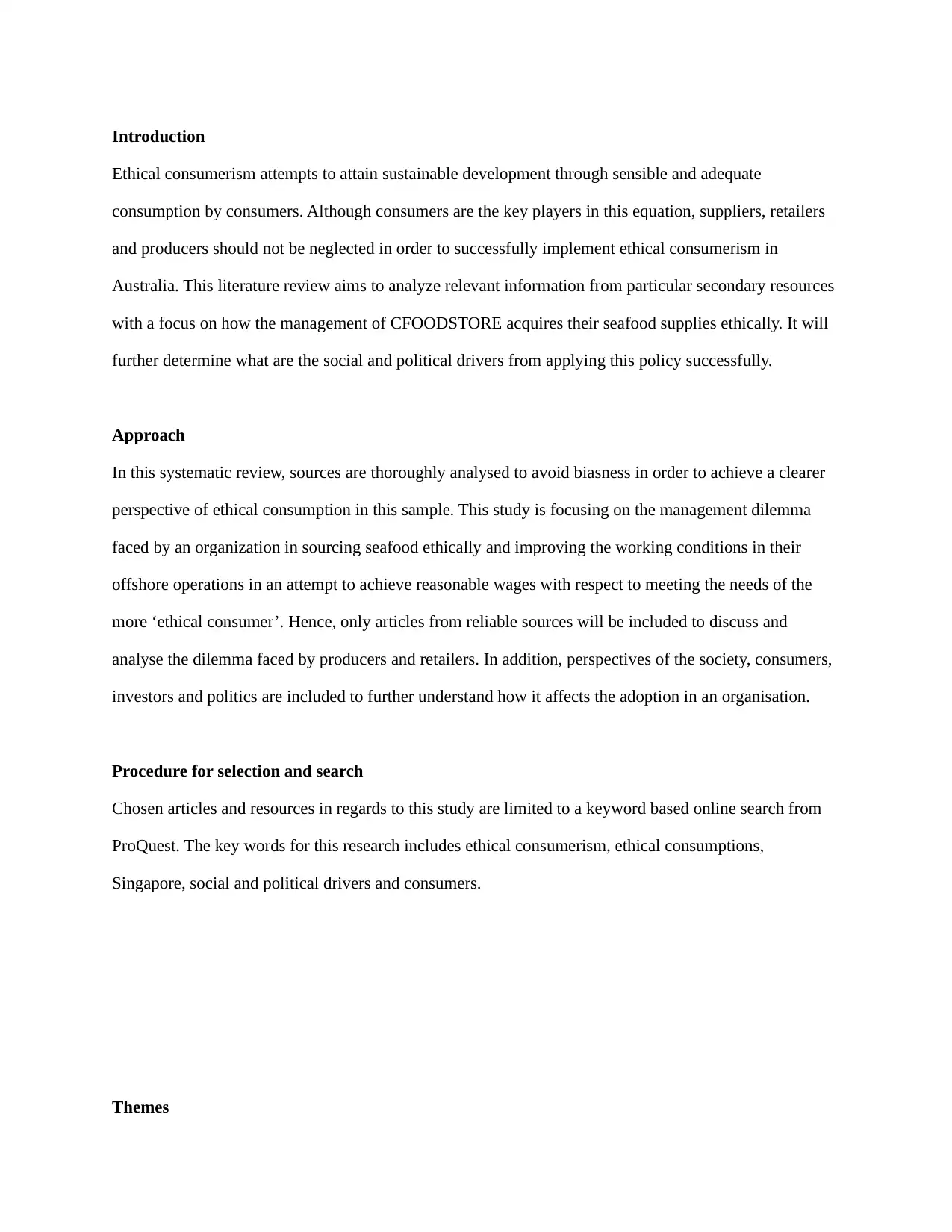
Introduction
Ethical consumerism attempts to attain sustainable development through sensible and adequate
consumption by consumers. Although consumers are the key players in this equation, suppliers, retailers
and producers should not be neglected in order to successfully implement ethical consumerism in
Australia. This literature review aims to analyze relevant information from particular secondary resources
with a focus on how the management of CFOODSTORE acquires their seafood supplies ethically. It will
further determine what are the social and political drivers from applying this policy successfully.
Approach
In this systematic review, sources are thoroughly analysed to avoid biasness in order to achieve a clearer
perspective of ethical consumption in this sample. This study is focusing on the management dilemma
faced by an organization in sourcing seafood ethically and improving the working conditions in their
offshore operations in an attempt to achieve reasonable wages with respect to meeting the needs of the
more ‘ethical consumer’. Hence, only articles from reliable sources will be included to discuss and
analyse the dilemma faced by producers and retailers. In addition, perspectives of the society, consumers,
investors and politics are included to further understand how it affects the adoption in an organisation.
Procedure for selection and search
Chosen articles and resources in regards to this study are limited to a keyword based online search from
ProQuest. The key words for this research includes ethical consumerism, ethical consumptions,
Singapore, social and political drivers and consumers.
Themes
Ethical consumerism attempts to attain sustainable development through sensible and adequate
consumption by consumers. Although consumers are the key players in this equation, suppliers, retailers
and producers should not be neglected in order to successfully implement ethical consumerism in
Australia. This literature review aims to analyze relevant information from particular secondary resources
with a focus on how the management of CFOODSTORE acquires their seafood supplies ethically. It will
further determine what are the social and political drivers from applying this policy successfully.
Approach
In this systematic review, sources are thoroughly analysed to avoid biasness in order to achieve a clearer
perspective of ethical consumption in this sample. This study is focusing on the management dilemma
faced by an organization in sourcing seafood ethically and improving the working conditions in their
offshore operations in an attempt to achieve reasonable wages with respect to meeting the needs of the
more ‘ethical consumer’. Hence, only articles from reliable sources will be included to discuss and
analyse the dilemma faced by producers and retailers. In addition, perspectives of the society, consumers,
investors and politics are included to further understand how it affects the adoption in an organisation.
Procedure for selection and search
Chosen articles and resources in regards to this study are limited to a keyword based online search from
ProQuest. The key words for this research includes ethical consumerism, ethical consumptions,
Singapore, social and political drivers and consumers.
Themes
Paraphrase This Document
Need a fresh take? Get an instant paraphrase of this document with our AI Paraphraser
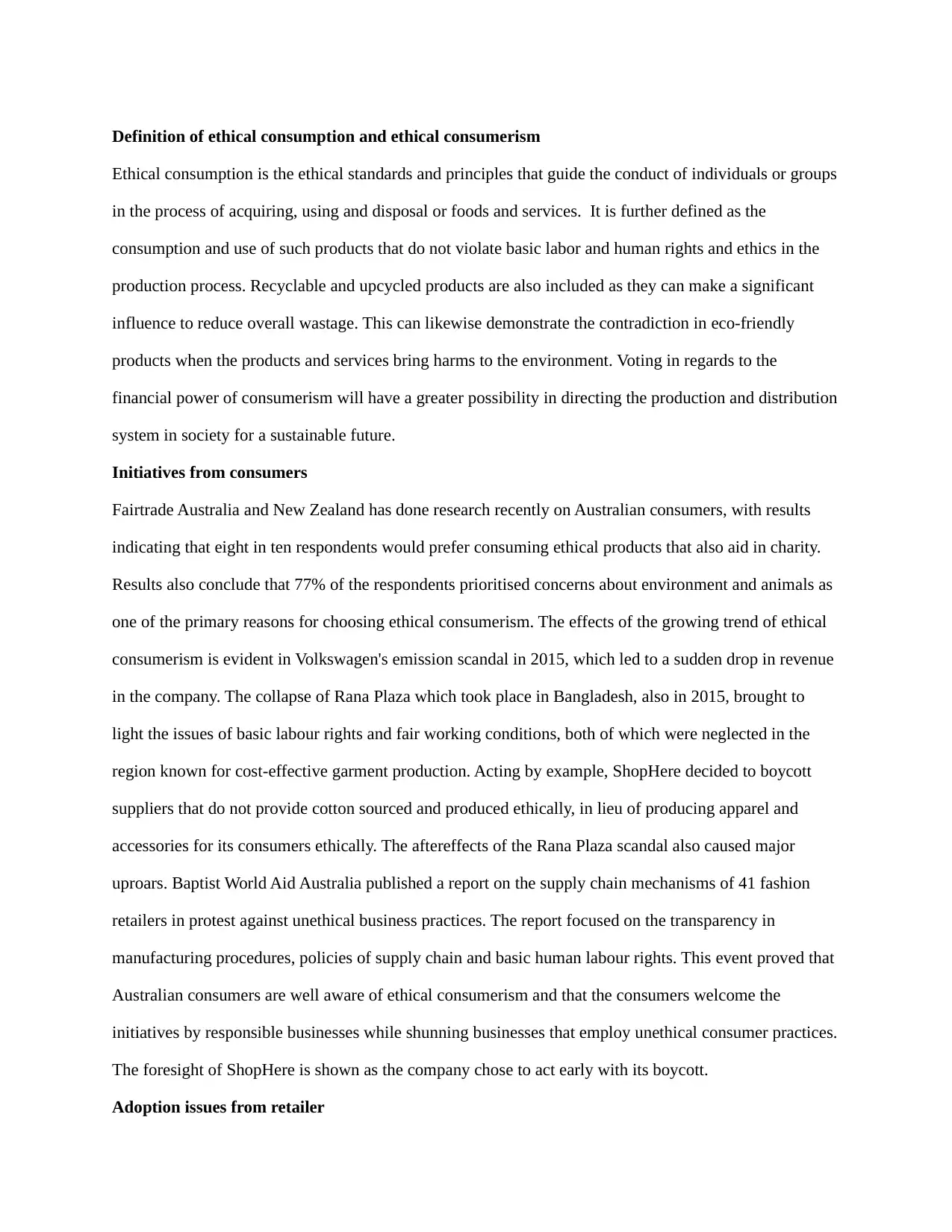
Definition of ethical consumption and ethical consumerism
Ethical consumption is the ethical standards and principles that guide the conduct of individuals or groups
in the process of acquiring, using and disposal or foods and services. It is further defined as the
consumption and use of such products that do not violate basic labor and human rights and ethics in the
production process. Recyclable and upcycled products are also included as they can make a significant
influence to reduce overall wastage. This can likewise demonstrate the contradiction in eco-friendly
products when the products and services bring harms to the environment. Voting in regards to the
financial power of consumerism will have a greater possibility in directing the production and distribution
system in society for a sustainable future.
Initiatives from consumers
Fairtrade Australia and New Zealand has done research recently on Australian consumers, with results
indicating that eight in ten respondents would prefer consuming ethical products that also aid in charity.
Results also conclude that 77% of the respondents prioritised concerns about environment and animals as
one of the primary reasons for choosing ethical consumerism. The effects of the growing trend of ethical
consumerism is evident in Volkswagen's emission scandal in 2015, which led to a sudden drop in revenue
in the company. The collapse of Rana Plaza which took place in Bangladesh, also in 2015, brought to
light the issues of basic labour rights and fair working conditions, both of which were neglected in the
region known for cost-effective garment production. Acting by example, ShopHere decided to boycott
suppliers that do not provide cotton sourced and produced ethically, in lieu of producing apparel and
accessories for its consumers ethically. The aftereffects of the Rana Plaza scandal also caused major
uproars. Baptist World Aid Australia published a report on the supply chain mechanisms of 41 fashion
retailers in protest against unethical business practices. The report focused on the transparency in
manufacturing procedures, policies of supply chain and basic human labour rights. This event proved that
Australian consumers are well aware of ethical consumerism and that the consumers welcome the
initiatives by responsible businesses while shunning businesses that employ unethical consumer practices.
The foresight of ShopHere is shown as the company chose to act early with its boycott.
Adoption issues from retailer
Ethical consumption is the ethical standards and principles that guide the conduct of individuals or groups
in the process of acquiring, using and disposal or foods and services. It is further defined as the
consumption and use of such products that do not violate basic labor and human rights and ethics in the
production process. Recyclable and upcycled products are also included as they can make a significant
influence to reduce overall wastage. This can likewise demonstrate the contradiction in eco-friendly
products when the products and services bring harms to the environment. Voting in regards to the
financial power of consumerism will have a greater possibility in directing the production and distribution
system in society for a sustainable future.
Initiatives from consumers
Fairtrade Australia and New Zealand has done research recently on Australian consumers, with results
indicating that eight in ten respondents would prefer consuming ethical products that also aid in charity.
Results also conclude that 77% of the respondents prioritised concerns about environment and animals as
one of the primary reasons for choosing ethical consumerism. The effects of the growing trend of ethical
consumerism is evident in Volkswagen's emission scandal in 2015, which led to a sudden drop in revenue
in the company. The collapse of Rana Plaza which took place in Bangladesh, also in 2015, brought to
light the issues of basic labour rights and fair working conditions, both of which were neglected in the
region known for cost-effective garment production. Acting by example, ShopHere decided to boycott
suppliers that do not provide cotton sourced and produced ethically, in lieu of producing apparel and
accessories for its consumers ethically. The aftereffects of the Rana Plaza scandal also caused major
uproars. Baptist World Aid Australia published a report on the supply chain mechanisms of 41 fashion
retailers in protest against unethical business practices. The report focused on the transparency in
manufacturing procedures, policies of supply chain and basic human labour rights. This event proved that
Australian consumers are well aware of ethical consumerism and that the consumers welcome the
initiatives by responsible businesses while shunning businesses that employ unethical consumer practices.
The foresight of ShopHere is shown as the company chose to act early with its boycott.
Adoption issues from retailer
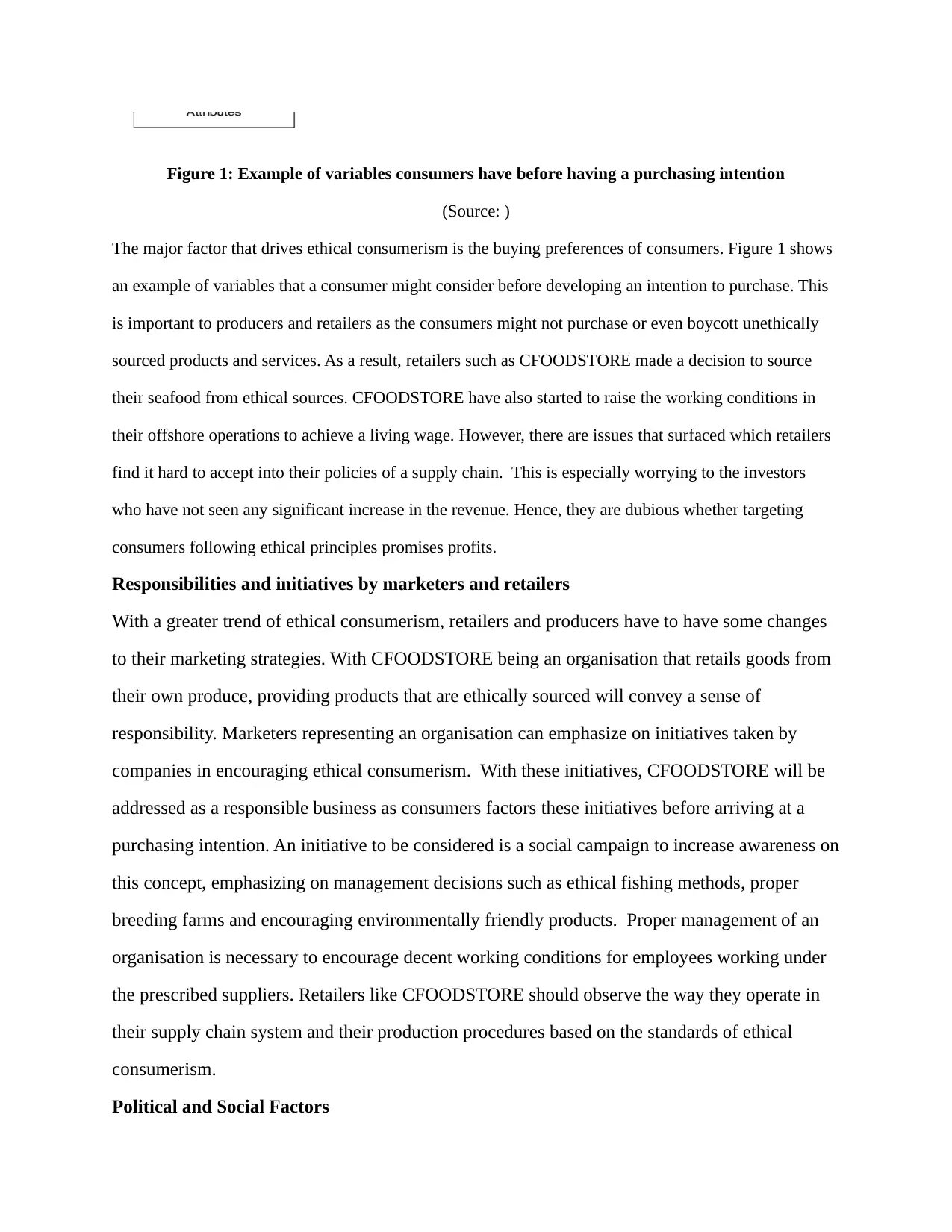
Figure 1: Example of variables consumers have before having a purchasing intention
(Source: )
The major factor that drives ethical consumerism is the buying preferences of consumers. Figure 1 shows
an example of variables that a consumer might consider before developing an intention to purchase. This
is important to producers and retailers as the consumers might not purchase or even boycott unethically
sourced products and services. As a result, retailers such as CFOODSTORE made a decision to source
their seafood from ethical sources. CFOODSTORE have also started to raise the working conditions in
their offshore operations to achieve a living wage. However, there are issues that surfaced which retailers
find it hard to accept into their policies of a supply chain. This is especially worrying to the investors
who have not seen any significant increase in the revenue. Hence, they are dubious whether targeting
consumers following ethical principles promises profits.
Responsibilities and initiatives by marketers and retailers
With a greater trend of ethical consumerism, retailers and producers have to have some changes
to their marketing strategies. With CFOODSTORE being an organisation that retails goods from
their own produce, providing products that are ethically sourced will convey a sense of
responsibility. Marketers representing an organisation can emphasize on initiatives taken by
companies in encouraging ethical consumerism. With these initiatives, CFOODSTORE will be
addressed as a responsible business as consumers factors these initiatives before arriving at a
purchasing intention. An initiative to be considered is a social campaign to increase awareness on
this concept, emphasizing on management decisions such as ethical fishing methods, proper
breeding farms and encouraging environmentally friendly products. Proper management of an
organisation is necessary to encourage decent working conditions for employees working under
the prescribed suppliers. Retailers like CFOODSTORE should observe the way they operate in
their supply chain system and their production procedures based on the standards of ethical
consumerism.
Political and Social Factors
(Source: )
The major factor that drives ethical consumerism is the buying preferences of consumers. Figure 1 shows
an example of variables that a consumer might consider before developing an intention to purchase. This
is important to producers and retailers as the consumers might not purchase or even boycott unethically
sourced products and services. As a result, retailers such as CFOODSTORE made a decision to source
their seafood from ethical sources. CFOODSTORE have also started to raise the working conditions in
their offshore operations to achieve a living wage. However, there are issues that surfaced which retailers
find it hard to accept into their policies of a supply chain. This is especially worrying to the investors
who have not seen any significant increase in the revenue. Hence, they are dubious whether targeting
consumers following ethical principles promises profits.
Responsibilities and initiatives by marketers and retailers
With a greater trend of ethical consumerism, retailers and producers have to have some changes
to their marketing strategies. With CFOODSTORE being an organisation that retails goods from
their own produce, providing products that are ethically sourced will convey a sense of
responsibility. Marketers representing an organisation can emphasize on initiatives taken by
companies in encouraging ethical consumerism. With these initiatives, CFOODSTORE will be
addressed as a responsible business as consumers factors these initiatives before arriving at a
purchasing intention. An initiative to be considered is a social campaign to increase awareness on
this concept, emphasizing on management decisions such as ethical fishing methods, proper
breeding farms and encouraging environmentally friendly products. Proper management of an
organisation is necessary to encourage decent working conditions for employees working under
the prescribed suppliers. Retailers like CFOODSTORE should observe the way they operate in
their supply chain system and their production procedures based on the standards of ethical
consumerism.
Political and Social Factors
⊘ This is a preview!⊘
Do you want full access?
Subscribe today to unlock all pages.

Trusted by 1+ million students worldwide
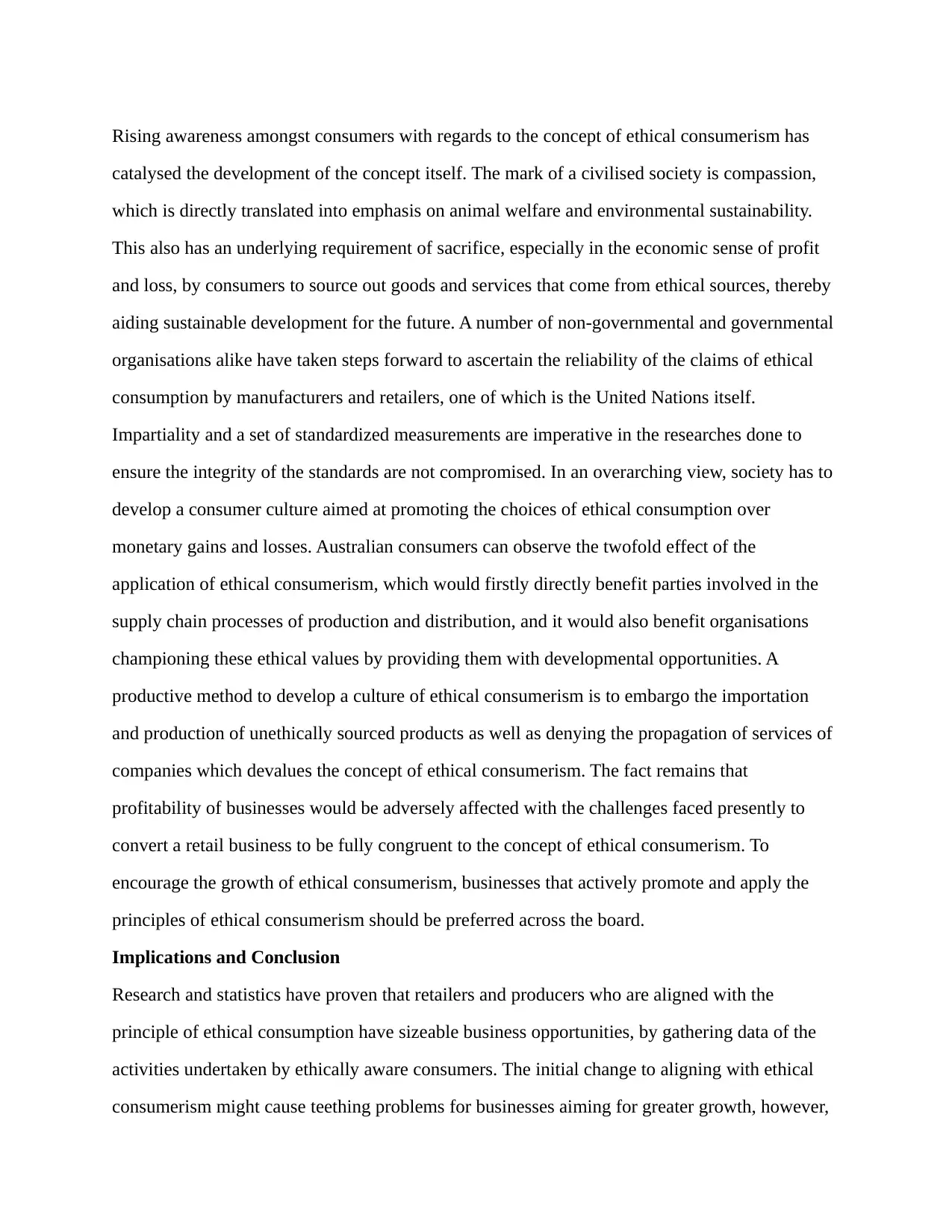
Rising awareness amongst consumers with regards to the concept of ethical consumerism has
catalysed the development of the concept itself. The mark of a civilised society is compassion,
which is directly translated into emphasis on animal welfare and environmental sustainability.
This also has an underlying requirement of sacrifice, especially in the economic sense of profit
and loss, by consumers to source out goods and services that come from ethical sources, thereby
aiding sustainable development for the future. A number of non-governmental and governmental
organisations alike have taken steps forward to ascertain the reliability of the claims of ethical
consumption by manufacturers and retailers, one of which is the United Nations itself.
Impartiality and a set of standardized measurements are imperative in the researches done to
ensure the integrity of the standards are not compromised. In an overarching view, society has to
develop a consumer culture aimed at promoting the choices of ethical consumption over
monetary gains and losses. Australian consumers can observe the twofold effect of the
application of ethical consumerism, which would firstly directly benefit parties involved in the
supply chain processes of production and distribution, and it would also benefit organisations
championing these ethical values by providing them with developmental opportunities. A
productive method to develop a culture of ethical consumerism is to embargo the importation
and production of unethically sourced products as well as denying the propagation of services of
companies which devalues the concept of ethical consumerism. The fact remains that
profitability of businesses would be adversely affected with the challenges faced presently to
convert a retail business to be fully congruent to the concept of ethical consumerism. To
encourage the growth of ethical consumerism, businesses that actively promote and apply the
principles of ethical consumerism should be preferred across the board.
Implications and Conclusion
Research and statistics have proven that retailers and producers who are aligned with the
principle of ethical consumption have sizeable business opportunities, by gathering data of the
activities undertaken by ethically aware consumers. The initial change to aligning with ethical
consumerism might cause teething problems for businesses aiming for greater growth, however,
catalysed the development of the concept itself. The mark of a civilised society is compassion,
which is directly translated into emphasis on animal welfare and environmental sustainability.
This also has an underlying requirement of sacrifice, especially in the economic sense of profit
and loss, by consumers to source out goods and services that come from ethical sources, thereby
aiding sustainable development for the future. A number of non-governmental and governmental
organisations alike have taken steps forward to ascertain the reliability of the claims of ethical
consumption by manufacturers and retailers, one of which is the United Nations itself.
Impartiality and a set of standardized measurements are imperative in the researches done to
ensure the integrity of the standards are not compromised. In an overarching view, society has to
develop a consumer culture aimed at promoting the choices of ethical consumption over
monetary gains and losses. Australian consumers can observe the twofold effect of the
application of ethical consumerism, which would firstly directly benefit parties involved in the
supply chain processes of production and distribution, and it would also benefit organisations
championing these ethical values by providing them with developmental opportunities. A
productive method to develop a culture of ethical consumerism is to embargo the importation
and production of unethically sourced products as well as denying the propagation of services of
companies which devalues the concept of ethical consumerism. The fact remains that
profitability of businesses would be adversely affected with the challenges faced presently to
convert a retail business to be fully congruent to the concept of ethical consumerism. To
encourage the growth of ethical consumerism, businesses that actively promote and apply the
principles of ethical consumerism should be preferred across the board.
Implications and Conclusion
Research and statistics have proven that retailers and producers who are aligned with the
principle of ethical consumption have sizeable business opportunities, by gathering data of the
activities undertaken by ethically aware consumers. The initial change to aligning with ethical
consumerism might cause teething problems for businesses aiming for greater growth, however,
Paraphrase This Document
Need a fresh take? Get an instant paraphrase of this document with our AI Paraphraser
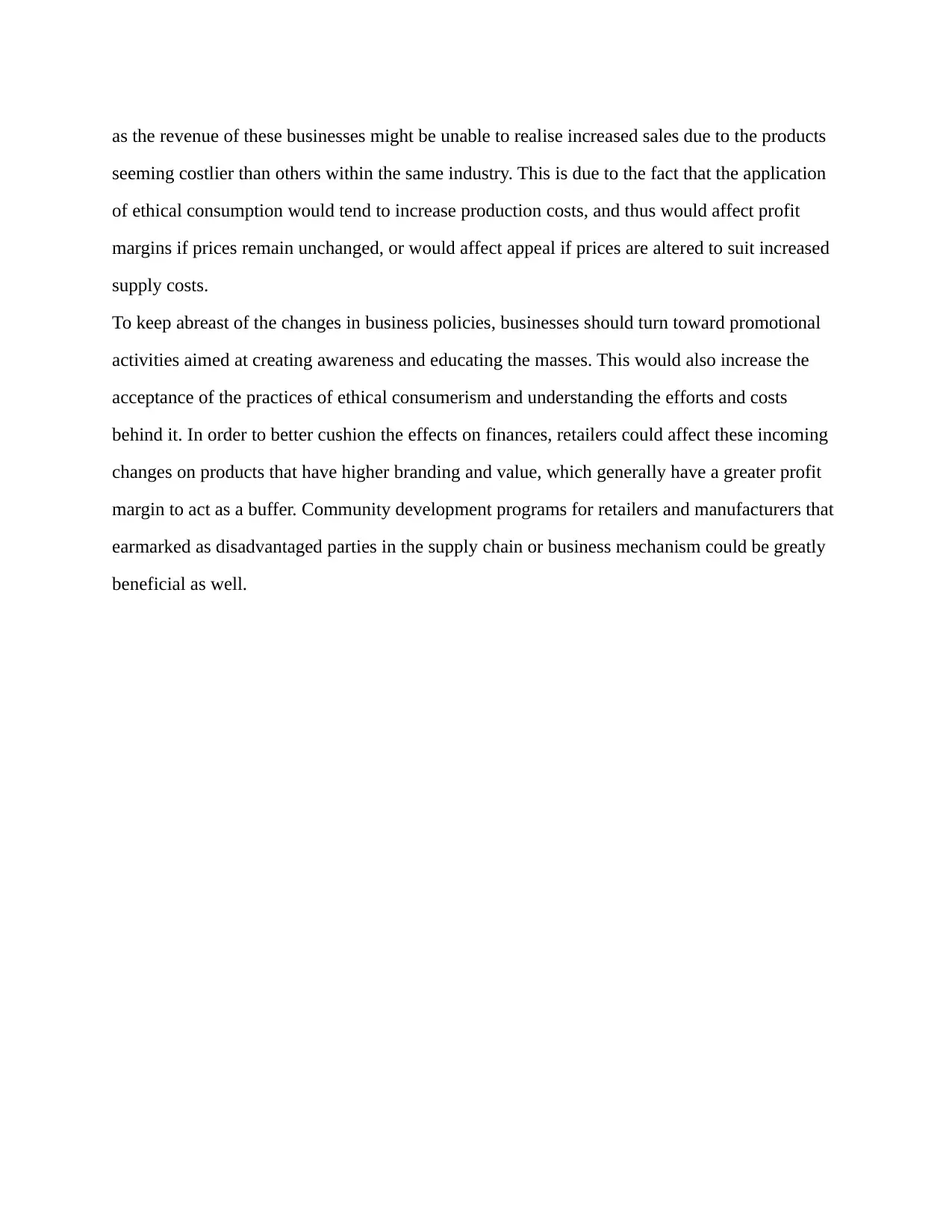
as the revenue of these businesses might be unable to realise increased sales due to the products
seeming costlier than others within the same industry. This is due to the fact that the application
of ethical consumption would tend to increase production costs, and thus would affect profit
margins if prices remain unchanged, or would affect appeal if prices are altered to suit increased
supply costs.
To keep abreast of the changes in business policies, businesses should turn toward promotional
activities aimed at creating awareness and educating the masses. This would also increase the
acceptance of the practices of ethical consumerism and understanding the efforts and costs
behind it. In order to better cushion the effects on finances, retailers could affect these incoming
changes on products that have higher branding and value, which generally have a greater profit
margin to act as a buffer. Community development programs for retailers and manufacturers that
earmarked as disadvantaged parties in the supply chain or business mechanism could be greatly
beneficial as well.
seeming costlier than others within the same industry. This is due to the fact that the application
of ethical consumption would tend to increase production costs, and thus would affect profit
margins if prices remain unchanged, or would affect appeal if prices are altered to suit increased
supply costs.
To keep abreast of the changes in business policies, businesses should turn toward promotional
activities aimed at creating awareness and educating the masses. This would also increase the
acceptance of the practices of ethical consumerism and understanding the efforts and costs
behind it. In order to better cushion the effects on finances, retailers could affect these incoming
changes on products that have higher branding and value, which generally have a greater profit
margin to act as a buffer. Community development programs for retailers and manufacturers that
earmarked as disadvantaged parties in the supply chain or business mechanism could be greatly
beneficial as well.
1 out of 5
Your All-in-One AI-Powered Toolkit for Academic Success.
+13062052269
info@desklib.com
Available 24*7 on WhatsApp / Email
![[object Object]](/_next/static/media/star-bottom.7253800d.svg)
Unlock your academic potential
Copyright © 2020–2026 A2Z Services. All Rights Reserved. Developed and managed by ZUCOL.
